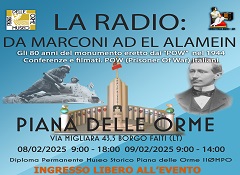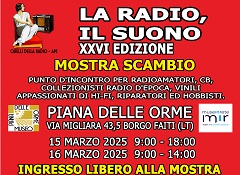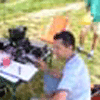ARISS contact planned with ESA Space Camp, Fleetwood, UK
Written by ON4WF
Thursday, 24 July 2014 17:40
An ARISS educational radio contact is planned with ESA Space Camp, Rossall School, Fleetwood, UK. The event is scheduled Tuesday July 29 at 14:01:13 UTC .It will be a telebridge contact operated by W6SRJ in California.
A video from the event will be webcast at: Http://www.batc.tv/streams/arissuk/
The contact will be broadcast on EchoLink AMSAT (node 101 377) and JK1ZRW (node 277 208) Conference servers, as well as on IRLP Discovery Reflector 9010.
This annual camp is organized by the ESA Space Camp Committee takes place in a different European country each summer for 2 weeks. This year the camp takes place between 27 July and 10 August where 185 young space explorers aged 8 to 17 will meet each other in the UK at Rossall School. The children come from the following ESA establishments (UK, France, Spain, Italy, The Netherlands and Germany). This will be the 20th Space Camp organised by ESA. This year the children will also be involved in celebrating this milestone with marking 50 years of ESA. Children, their parents and educators from the area will join the ESA campers on this special celebration day. Rossall is a boarding school situated on a beautiful 160-acre site, there is plenty of room for extensive sports and cultural facilities, including a swimming pool, squash and tennis courts, as well as a fitness room and a climbing wall.
The ESC 2014 programme will feature a balanced mix of sports such as flag rugby, lifeguarding, kayaking and martial arts. The theme for camp will be ‘Reach for the Stars!’ Well-equipped IT labs, classrooms and an on-site planetarium will be instrumental in setting up a space education programme that will keep the children motivated with new and exciting hands-on activities and educational tasks involving space-related themes, as well as learning about the culture of the host country. As with all ESA Space Camps, there will be specific emphasis placed on socialisation and respect among the participants. We hope to make the camp a really unique experience for juniors and teenagers who are in the process of becoming citizens of a multicultural society. This ARISS contact will mark a highlight in the space education programme as children will be learning about many aspects related to man’s endeavours to reach for the stars!
Students will ask as many of following questions as time allows:
1. Zachary (12): What has been your biggest challenge since being in space?
2. Noemi (11): On Earth bubbles in sparkling water (or cola) float upwards, but in the ISS, there is no up and down. Which direction do the bubbles go in sparkling water (or cola) on the ISS?
3. Kai (9): If you could change one thing on the ISS, what would it be?
4. Caroline (8): How do you sleep and for how long?
5. Lisann (10): Do you need sunscreen in space?
6. Nassim (8): Why do we have plenty of oxygen on earth, but not enough in space?
7. Auriane (10): Do you see time passing by in space? Do you have the same feeling of time duration (days & nights)?
8. William Baker (12): Can you give us an example of some added safety procedures or precautions you must take in doing everyday tasks while on the ISS?
9. Eduardo García (8): Why is there no oxygen outside the ISS?
10. Sonia ERNST: How long does it take to go around our planet?
11. Damien (9): What were your last thoughts when leaving earth?
12. Tristan (8): How do you keep your clothes clean on the Space Station with so little water?
13. Marie (8): Are there any seasons on the ISS?
14. Emil (8): What do you do for fun on the ISS?
15. Charles (13): I have been fascinated by the film "Gravity”. How realistic is the film? Is space crowded by debris and therefore so dangerous?
16. Roxane (10): How many switches are there inside the spacecraft, and do you know what all of them do?
17. Andrew (13): Is it highly stressful to be in space?
18. Ella (9): How do you have a bath when the water goes everywhere?
19. Benjamin (11): How do you dispose of the waste?
20. Luca (13): How are medical surgeries done in space if a specialized doctor is not available?
21. Lena (11): How is it in the ISS, when you arrive the first time? Was the journey comfortable?
22. Giulio (10): What would you like to achieve that you haven\'t yet?
23. Eveline (9): I\'ve been practicing various types of sports the last years, and now I still do judo. What sports can you practice in the International Space Station, a weightless environment?
ARISS is an international educational outreach program partnering the participating space agencies, NASA, Russian Space Agency, ESA, CNES, JAXA, and CSA, with the AMSAT and IARU organizations from participating countries.
ARISS offers an opportunity for students to experience the excitement of Amateur Radio by talking directly with crewmembers onboard the International Space Station. Teachers, parents and communities see, first hand, how Amateur Radio and crewmembers on ISS can energize youngsters\' interest in science, technology and learning.
Thursday, 24 July 2014 17:40
An ARISS educational radio contact is planned with ESA Space Camp, Rossall School, Fleetwood, UK. The event is scheduled Tuesday July 29 at 14:01:13 UTC .It will be a telebridge contact operated by W6SRJ in California.
A video from the event will be webcast at: Http://www.batc.tv/streams/arissuk/
The contact will be broadcast on EchoLink AMSAT (node 101 377) and JK1ZRW (node 277 208) Conference servers, as well as on IRLP Discovery Reflector 9010.
This annual camp is organized by the ESA Space Camp Committee takes place in a different European country each summer for 2 weeks. This year the camp takes place between 27 July and 10 August where 185 young space explorers aged 8 to 17 will meet each other in the UK at Rossall School. The children come from the following ESA establishments (UK, France, Spain, Italy, The Netherlands and Germany). This will be the 20th Space Camp organised by ESA. This year the children will also be involved in celebrating this milestone with marking 50 years of ESA. Children, their parents and educators from the area will join the ESA campers on this special celebration day. Rossall is a boarding school situated on a beautiful 160-acre site, there is plenty of room for extensive sports and cultural facilities, including a swimming pool, squash and tennis courts, as well as a fitness room and a climbing wall.
The ESC 2014 programme will feature a balanced mix of sports such as flag rugby, lifeguarding, kayaking and martial arts. The theme for camp will be ‘Reach for the Stars!’ Well-equipped IT labs, classrooms and an on-site planetarium will be instrumental in setting up a space education programme that will keep the children motivated with new and exciting hands-on activities and educational tasks involving space-related themes, as well as learning about the culture of the host country. As with all ESA Space Camps, there will be specific emphasis placed on socialisation and respect among the participants. We hope to make the camp a really unique experience for juniors and teenagers who are in the process of becoming citizens of a multicultural society. This ARISS contact will mark a highlight in the space education programme as children will be learning about many aspects related to man’s endeavours to reach for the stars!
Students will ask as many of following questions as time allows:
1. Zachary (12): What has been your biggest challenge since being in space?
2. Noemi (11): On Earth bubbles in sparkling water (or cola) float upwards, but in the ISS, there is no up and down. Which direction do the bubbles go in sparkling water (or cola) on the ISS?
3. Kai (9): If you could change one thing on the ISS, what would it be?
4. Caroline (8): How do you sleep and for how long?
5. Lisann (10): Do you need sunscreen in space?
6. Nassim (8): Why do we have plenty of oxygen on earth, but not enough in space?
7. Auriane (10): Do you see time passing by in space? Do you have the same feeling of time duration (days & nights)?
8. William Baker (12): Can you give us an example of some added safety procedures or precautions you must take in doing everyday tasks while on the ISS?
9. Eduardo García (8): Why is there no oxygen outside the ISS?
10. Sonia ERNST: How long does it take to go around our planet?
11. Damien (9): What were your last thoughts when leaving earth?
12. Tristan (8): How do you keep your clothes clean on the Space Station with so little water?
13. Marie (8): Are there any seasons on the ISS?
14. Emil (8): What do you do for fun on the ISS?
15. Charles (13): I have been fascinated by the film "Gravity”. How realistic is the film? Is space crowded by debris and therefore so dangerous?
16. Roxane (10): How many switches are there inside the spacecraft, and do you know what all of them do?
17. Andrew (13): Is it highly stressful to be in space?
18. Ella (9): How do you have a bath when the water goes everywhere?
19. Benjamin (11): How do you dispose of the waste?
20. Luca (13): How are medical surgeries done in space if a specialized doctor is not available?
21. Lena (11): How is it in the ISS, when you arrive the first time? Was the journey comfortable?
22. Giulio (10): What would you like to achieve that you haven\'t yet?
23. Eveline (9): I\'ve been practicing various types of sports the last years, and now I still do judo. What sports can you practice in the International Space Station, a weightless environment?
ARISS is an international educational outreach program partnering the participating space agencies, NASA, Russian Space Agency, ESA, CNES, JAXA, and CSA, with the AMSAT and IARU organizations from participating countries.
ARISS offers an opportunity for students to experience the excitement of Amateur Radio by talking directly with crewmembers onboard the International Space Station. Teachers, parents and communities see, first hand, how Amateur Radio and crewmembers on ISS can energize youngsters\' interest in science, technology and learning.



 . . . . . . . . . . .
. . . . . . . . . . . 







